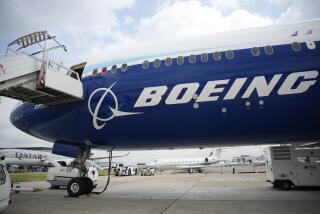Boeing Removes Manager of Its U.S. Missile Defense Program
- Share via
WASHINGTON — Boeing Co. said Wednesday it has removed the manager of its troubled program to develop a U.S. missile defense system.
John B. Peller, a 41-year Boeing veteran, has taken a new position within the company and no replacement has been named, the company said.
The shift comes one day after the Defense Department said it’s delaying its recommendation on whether President Clinton should authorize construction of the program’s key radar in Alaska, a crucial step that would allow deployment of an initial system by 2005.
One factor in the delay is Boeing’s problems in developing the three-stage booster rockets that will power Raytheon Co. antimissile warheads into space.
The Pentagon is assessing the cumulative impact of these delays. Each of the first three tests of the booster rocket have been delayed by as much as one year, according to July 25 Pentagon briefing charts. All three were to have been completed by Sept. 30. The first test is now scheduled for November at the earliest and the third won’t be held before Sept. 30, 2001.
Defense Secretary William S. Cohen was to have made his recommendation to Clinton on whether the U.S. should proceed with the system by July 31. That date has been pushed back several weeks.
The U.S. National Missile Defense system ultimately envisions a network of ground-based radar, low-orbiting satellites, communications equipment and at least 100 interceptor missiles based in Alaska or North Dakota. The system’s cost is currently pegged at $36.2 billion.
Boeing has a $2.2-billion three-year contract to develop and integrate the complex components of what’s to be a $36.2-billion system of 100 interceptors, warheads, radar and communications links.
Peller, who has been manager of the National Missile Defense system for more than two years, was named vice president of Strategic Missile Defense.
“Dr. Peller has made outstanding contributions to the program and has propelled the program from initial development through extensive ground testing to a complex flight test program,” said Boeing Space and Communications Group President James Albaugh in a statement.
Boeing shares fell 63 cents to $47.75 on the New York Stock Exchange.
More to Read
Inside the business of entertainment
The Wide Shot brings you news, analysis and insights on everything from streaming wars to production — and what it all means for the future.
You may occasionally receive promotional content from the Los Angeles Times.










